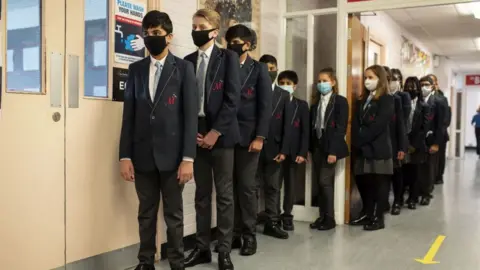Surge in pupils at school in lockdown sparks call for limit
 PA Media
PA MediaHeads are calling for limits to the number of pupils in school during lockdown in England, with attendance rates surging to 50% in some places.
The two head teachers' unions, NAHT and ASCL, say the high numbers attending could hamper the fight against the virus.
The Department for Education has widened the categories of vulnerable and key worker pupils who can attend.
It is insisting that schools ensure all children who qualify can attend.
'We're at risk'
The widened categories not only include vulnerable pupils and children of workers in critical occupations but also those who cannot access remote learning either because they do not have devices or space to study.
Children of parents working on the Brexit arrangements are also included.
Teachers have described streets around schools being packed with parents dropping off their children and almost all staff having to come in and work despite the lockdown.
Heads say they fear schools could be overwhelmed by children who do not have access to lap tops to learn remotely.
Jessica Jane, a learning assistant at a school in Hampshire, told the BBC: "I work in a primary school where we are having to bring in every single member of staff as the list of key-workers is vast in our area and over 50% of our children are attending.
"Our community school is not closed and streets are packed with parents morning and afternoon collecting their children from open schools."
Surge in numbers
She added: "My colleagues and I are still being put at risk every single day as are our families."
A teacher from the Midlands who did not wish to be named said the number had risen from 10 pupils a day in the first lockdown to about 90 a day this week.
"We're talking just under to just over a third of the usual amount of pupils for our school here.
"The vast majority are key worker children, not vulnerable.
"I also know that other primary schools in our area have similar amounts of children in school - one neighbouring school in particular, which is only slightly larger than us, is estimating/averaging 100 to 160 children in school every day."
Geoff Barton, general secretary of the Association of School and College Leaders, called the lack of limits "bizarre... in a week when the prime minister has told the nation that it is necessary to move schools to remote education in order to suppress coronavirus transmission".
"We are hearing reports that attendance in some primary schools is in excess of 50% because of demand from critical workers and families with children classed as vulnerable under criteria which has been significantly widened," he said.
"We are urgently seeking clarification about the maximum number who should be in school while protecting public health.
"This seems completely illogical given the fact that the government has taken the drastic action of a full national lockdown precisely in order to limit contacts."
Virus transmission
Paul Whiteman, general secretary of National Association of Head Teachers, said schools could not "meet the demand created by government and reduce social mixing in the way the prime minister announced".
"The government acknowledges that schools do play a role in the transmission of the virus. Therefore, there comes a point when occupancy levels might be so high that they work against the efforts to bring down infection rates in communities, as is the national aim.
"This could result in prolonging the amount of time pupils are away from the classroom, which we are all anxious to avoid."
A Department for Education spokesman said: "Schools are open for vulnerable children and the children of critical workers. We expect schools to work with families to ensure all critical worker children are given access to a place if this is required.
"If critical workers can work from home and look after their children at the same time then they should do so, but otherwise this provision is in place to enable them to provide vital services.
"The protective measures that schools have been following throughout the autumn term remain in place to help protect staff and students, while the national lockdown helps reduce transmission in the wider community."
But Emma Knights, chief executive of the National Governance Association, reflected head teachers' concerns, saying between 40 and 60% of pupils were attending schools across England.
"The real problem is we have got two different national narratives going on," she said - with the prime minister saying "stay at home" but the DfE telling schools to take all eligible children who turn up.
Infection rates
Dr Mary Bousted, joint general secretary of the National Education Union, said the government seemed unable to decide whether schools were safe or unsafe.
Commenting on the latest Coronavirus Infection Survey from the Office for National Statistics, Dr Bousted, said: "Let this data end their confusion. Schools are clearly driving infection amongst children, and then onto the wider community.
"This peaked on Christmas Day with one in every 27 secondary-age children and one in 40 primary-age children infected.
"In London this rises to one in 18 secondary pupils and one in 23 primary pupils. These figures are truly shocking and entirely the result of government negligence."
